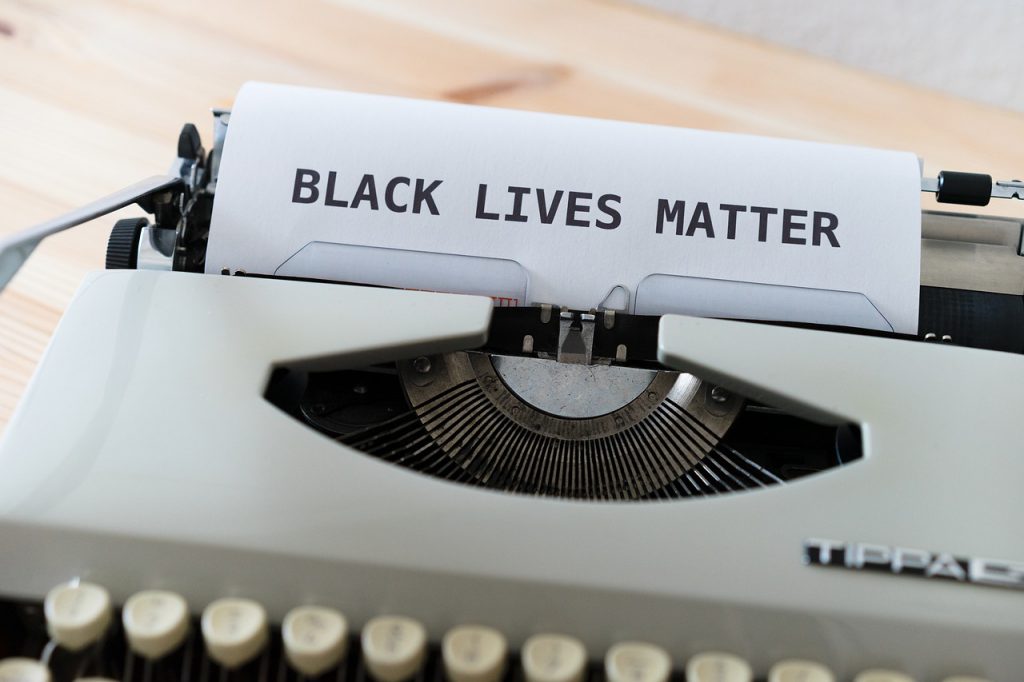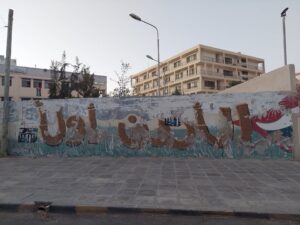The Future of Law Enforcement in the Age of #BlackLivesMatter [English]

Ilustrasi Black LIves Matter. Sumber: Pixabay.com
ISAFIS Monthly Writing Challenge – July 2020
“The problem is not police training, police diversity, or police methods. The problem is policing itself.” – Alex S. Vitale
Carl Hiaasen, a prominent American writer, once said, “Public outrage is the best antidote because it often leads to change.” That seemed to be the case in May 2020 after the wrongful death of George Floyd, a 46-year-old Afro-American man, by a white police officer in Minneapolis, Minnesota. Floyd’s passing triggered a wave of widespread anger under the #BlackLivesMatter movement. With over 23 million people participating in nationwide protests and even abroad, it became the largest movement in the United States’ history to date.[1] The long-running systematic mistreatment by law enforcers to black people caused a pent-up frustration that was not only expressed in peaceful demonstrations, but also through riots and lootings. During those times, videos and social media threads of police brutality circulated rampantly. Officers were seen shoving an elderly white man to the ground, attacking street medics, surging into a crowd of peaceful protesters, and many more. Previous police violence cases, such as the shooting of Breonna Taylor, also came to light. As a result, the majority of the citizens now sees the police force as a threat to their safety which is evidently ironic since they are supposed to be the one that protects the public.[2] Thus, this raises a question – what do the future of law enforcement and public safety look like in a more progressive America?
There are three options of policing reform that was widely discussed. The first one, perhaps the most famous out of all choices, is to defund the police. Contrary to popular belief, defunding the police is not completely cutting their notoriously high budget until they are left with no money to operate. It simply means reallocating some of their funds to other social services that are more beneficial to the community such as healthcare facilities, schooling, or even mental health agencies. For example, rather than dialling 911 and have a police officer dispatched to a drug overdose situation, a medical professional would respond instead.[3] This option was done by the Los Angeles City Council in July 2020 that cut their police department’s budget by $150 million. New York City lawmakers also reallocated nearly $484 million of their police budget to community-building infrastructures.[4]
The second type of reform is to dismantle the police. By doing so, the current policing system will be disbanded and a new model will be built without erasing the police department itself. Alternatively, their approach to public safety should be made accountable to an organized community, emphasizing on policy innovation as well. This change was previously carried out by the Camden County Police Department in 2012 when they disbanded and rebuilt their force it into a non-unionized model of 400 officers to safeguard the city. However, Camden officials did it because their police department was going bankrupt, not because people were protesting like nowadays.[5] After Floyd’s death, the Minneapolis City Council approved a proposal to allow their police department to be dismantled. Nonetheless, #BlackLivesMatter supporters stated that there is a lack of a concrete plan to make this type of reform successful.
Lastly, and possibly the most controversial choice, is to abolish the police. By doing so, policing will be completely replaced with other mechanisms of public safety, preferably a community-based one. The #BlackLivesMatter movement itself has a dedicated page called the “8 to Abolition”, a campaign consisting of eight steps that need to be undertaken in order to create a police-free society.[6] Police abolitionists believe that policing, as a system, is inherently flawed and cannot be fixed by just transforming it. According to them, the institution’s origin is deeply rooted in the ideas of white supremacy and settler colonialism.[7] For example, policing in the Southern States originated from what was then called the “slave patrols” – a group of armed white men in the 1700-1800s whose job is to enforce discipline on enslaved black people. Therefore, the whole institution needs to be disempowered and disarmed altogether because of its racist historical records.
At the end of the day, the goal of every reform is to create an American society that doesn’t rely on policing as a means to enforce law and order. The #BlackLivesMatter movement aims to construct a community-based public safety system, supported with nonviolent emergency responders in order to protect the livelihood of every citizen of all races. However, it is important to note that any reform, regardless of the scenario that might be used, needs to be done in a strategic and gradual manner in order for it to succeed. Therefore, the debate over the future of law enforcement in the age of #BlackLivesMatter is all about a discourse over the likelihood of a police-free society, driven by marginalized communities who desperately want to feel safe in the so-called “land of the free.”
Sources:
Adamczyk, Alicia. “What it actually means to defund the police.” Consumer News and Business
Channel. CNBC Make It (Jun 15, 2020). Accessed through https://www.cnbc.com/2020/06/15/what-it-actually-means-to-defund-the-police.html.
Brooks, David. “The Culture of Policing Is Broken.” The Atlantic (June 16, 2020). Accessed through
https://www.theatlantic.com/ideas/archive/2020/06/how-police-brutality-gets-made/613030/.
Buchanan, Larry. “Black Lives Matter May Be The Largest Movement in U.S. History.” The
New York Times. The New York Times Company (July 3, 2020). Accessed through:
https://www.nytimes.com/interactive/2020/07/03/us/george-floyd-protests-crowd-size.html
Coleman, Aaron Ross. “Police reform, defunding, and abolition, explained.” Vox (July 16, 2020).
Accessed through https://www.vox.com/21312191/police-reform-defunding-abolition-black-lives-matter-protests.
Dewan, Shaila and Mike Baker. “Facing Protests Over Use of Force, Police Respond With More
Force.” The New York Times. The New York Times Company (June 2, 2020). Accessed through https://www.nytimes.com/2020/05/31/us/police-tactics-floyd-protests.html.
Zernike, Kate. “To Fight Crime, a Poor City Will Trade In Its Police.” The New York Times. The
New York Times Company (September 28, 2012). Accessed through https://www.nytimes.com/2012/09/29/nyregion/overrun-by-crime-camden-trades-in-its-police-force.html.
8 To Abolition. “Abolitionist Policy Changes to Demand from Your City Officials.” PDF Campaign
Document. Accessed through https://www.8toabolition.com.
[1] Larry Buchanan. “Black Lives Matter May Be The Largest Movement in U.S. History.” The New York Times. The New York Times Company (July 3, 2020). Accessed through: https://www.nytimes.com/interactive/2020/07/03/us/george-floyd-protests-crowd-size.html.
[2] Shaila Dewan and Mike Baker. “Facing Protests Over Use of Force, Police Respond With More Force.” The New York Times. The New York Times Company (June 2, 2020). Accessed through https://www.nytimes.com/2020/05/31/us/police-tactics-floyd-protests.html.
[3] Alicia Adamczyk. “What it actually means to defund the police.” Consumer News and Business Channel. CNBC Make It (Jun 15, 2020). Accessed through https://www.cnbc.com/2020/06/15/what-it-actually-means-to-defund-the-police.html.
[4] David Brooks. “The Culture of Policing Is Broken.” The Atlantic (June 16, 2020). Accessed through https://www.theatlantic.com/ideas/archive/2020/06/how-police-brutality-gets-made/613030/.
[5] Kate Zernike. “To Fight Crime, a Poor City Will Trade In Its Police.” The New York Times. The New York Times Company (September 28, 2012). Accessed through https://www.nytimes.com/2012/09/29/nyregion/overrun-by-crime-camden-trades-in-its-police-force.html
[6] 8 To Abolition. “Abolitionist Policy Changes to Demand from Your City Officials.” PDF Campaign Document. Accessed through https://www.8toabolition.com.
[7] Aaron Ross Coleman. “Police reform, defunding, and abolition, explained.” Vox (July 16, 2020). Accessed through https://www.vox.com/21312191/police-reform-defunding-abolition-black-lives-matter-protests.
Quinta Allaya Emirsyah is an undergraduate student in International Relations, University of Indonesia and a member of Indonesia Student Association for International Studies (ISAFIS)





